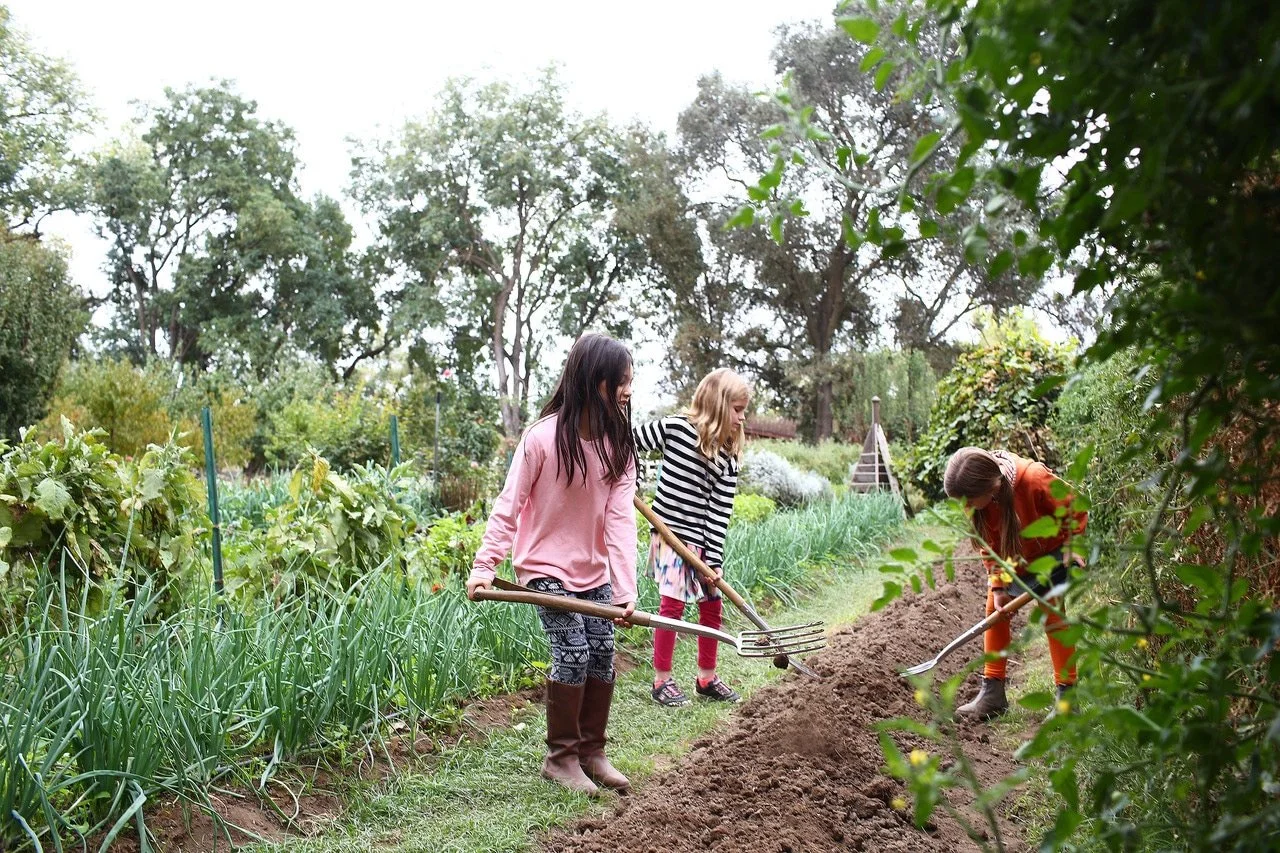Growing Tomorrow’s Leaders – The Work of our School Farm
By Stephen Payne
Any time you are given a tool, and it is put in your hand, the body naturally wants to take that tool and make it part of itself. The mind will discover how to bend, twist, angle, and manipulate the tool finding its usefulness.
The tool is no longer just this innate thing in your hand. It becomes a part of you in order to tackle any given task or problem.
This extension of the hand begins to develop a relationship between our students and tools, problem solving and their inner voice.

On the farm, there are many different tools and many different jobs. We care for the whole farm with students by appointing age-appropriate tasks to each grade.
A student in 3rd grade will have many experiences with digging forks, leaf rakes, short-handled shovels, saws and hammers.
Our 4th grades perform many animal husbandry duties and spend a lot of time with scooping shovels, rakes, digging shovels, grooming brushes and curry combs.

Our 5th through 8th grade students are busy with plant care and gardening tools, while high school students work with pruners, loppers, saws, and ladders in caring for our fruit trees.
This relationship with tools helps develop a child’s relationship to work, their environment, and plant and animal kingdoms, while also establishing neurological, problem-solving pathways as they set goals, tackle challenges, and perform duties caring for the farm.
It is a profound experience that is also fun, which is how our farm becomes a hub for learning in an exhilarating, physical, real-world context.
Children don’t often realize how much they are learning because of the mix of work and fun on the farm.

Just as the seasons cycle through our landscape and our plants, our children cycle through awakening, creating and hibernating to grow. Just like all living things on campus change and transform, so do our students, through cycles of growth and development.
What children learn on the farm aligns with what they learn in the classroom. Often, what they do out here is a living support experience to what they learn with their main lesson teacher.
Yet much more is experienced on this farm that goes far deeper than we can know.
While we try to deliberately immerse children in all aspects of the farm through the years of our gardening curriculum, there are countless lessons we cannot anticipate that go deep and shape the people they will become.
For instance, in 4th grade, students learn about the relationship between animals and man. Out here, they care for animals, notice how different they are from humans, recognize that we have a responsibility to care for them, and they discover similarities with animals, too.
Fifth-graders study botany in the classroom and on the farm, working with herb families and sowing seeds, watching the beginning stages of plant growth.

Sixth-graders focus deeply on vegetable crop rotation with lots of digging beds and composting crops just as they study geology in the classroom. They also help us harvest and sell our produce every week, which supports their business/economic lessons in class. The farm stand experience sharpens basic math skills as pre-algebra and geometry are coming.
Our school has a unique location with the 3.5-acre farm nestled on the bank of the American River in an ideal, year-round growing climate. This is against a backdrop of the Sacramento region gaining attention as an agricultural hub – whether for its Farm-to-Fork capitol designation or for the “big agriculture” efforts that surround our city.
Waldorf Education is focused on the development of the whole child with equal importance placed on social, emotional, musical, spatial, naturalist and motivational intelligences as with cognitive-intellectual learning.

Waldorf Education’s pedagogical principles were set forth by Rudolf Steiner a century ago in Germany, and these principles have now spread worldwide. At about the same time, Steiner’s work with farmers, who were concerned with the overuse of chemical pesticides and fertilizers, set forth a new natural-based, balanced approach to agriculture which is known worldwide as Biodynamic Agriculture.
Biodynamics not only influences our gardening curriculum as we teach responsible stewardship, but it was the inspiration for organic farming standards used today.
Our gardening curriculum lays a foundation for leadership skills such as observation, patience and following tasks through to the end. The students are well-prepared for careers related to science and the environment and develop a work ethic that translates into all fields.
Our goal in the moment, while we have these burgeoning souls on the farm, is to prepare students to be ready to work, develop resilience, get their hands dirty, tackle tasks and problem-solve, which ultimately makes them leaders in any field they choose to devote their efforts to once they leave Sacramento Waldorf School.
We are not born with the skills needed to work or to problem-solve. They must be nurtured. They must be cultivated.

As we use our hands, this relationship between handiness and thinking strengthens our personal relationship to our own doing and problem-solving. Our inner voice awakens to cheer ourselves on, to offer votes of confidence, to analyze obstacles to internally walk through step-by-step problem-solving processes.
The earlier our hands become useful, the stronger this inner voice speaks, and the more ready we are to solve more than our own problems.
We all need to build the neurological pathways between hand use and thinking, but the earlier it happens, the better. Such connections build on themselves, creating links in more complex ways, over time, through experiences, and the brain becomes able to think in more complex ways.
Growing tomorrow’s leaders - that is the important work we do on our school farm.
Stephen Payne is the resident farmer and director of the gardening curriculum at Sacramento Waldorf School.

